Is Ceredigion home to the best sheepdog breeder in the world?
This impressive headline was only to be replaced by another this week, for a record-breaking sale of Plascwta Jen, daughter of Bob, for £24,550.
In 2021, Dewi Jenkins from Tynygraig in Talybont also broke a world record for the world’s most expensive sheepdog, selling the red and white collie Kim for £27,100.
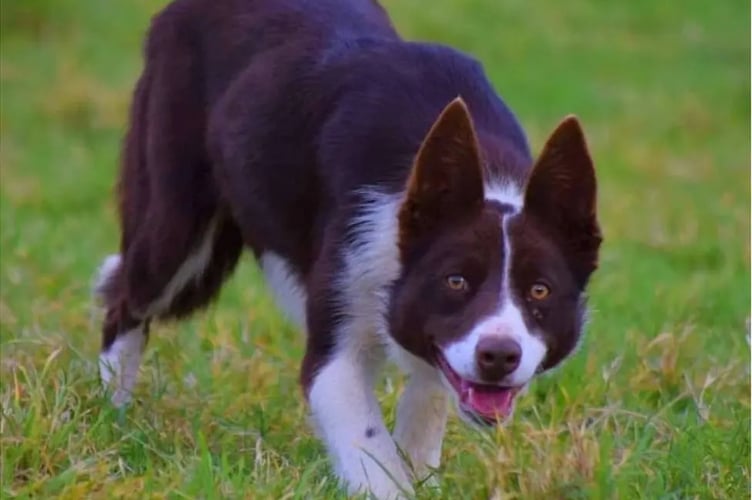
Dewi has been described as “undoubtedly the man of the moment” when it comes to price on working sheepdog sales across the world - with sales sending pups to the mountains of Norway, farms in the US, Belgium, France and the hills of the Republic of Ireland.
The numbers are no doubt starting to point to the Welsh sheep farmer as one of the best, if not the best, sheepdog breeders in the world.
So what’s Dewi Jenkins’ secret?
Is it the impressive bloodline, or is it Dewi’s dedication to the dogs (having started working with dogs as an eight-year-old, giving him 24 years of experience under his belt already) that makes these working dogs?
Both Jock and Bob have won top prize at the International Sheepdog Trials over the years - Bob “firmly” driving the sheep to win top dog this year, and Jock in 2022, competing against 150 other dogs to win the International Supreme title.
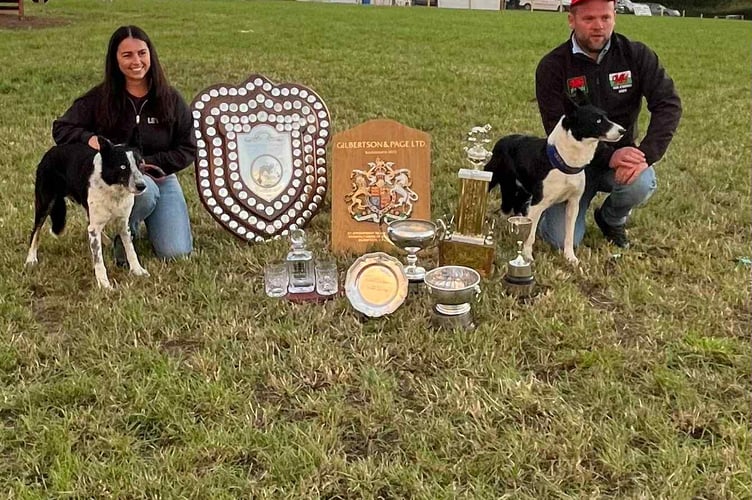
These black and white border collies, described as “well-bred” with “impeccable Welsh bloodlines”, have proved unbeatable in the trials, and their offspring have garnered international attention and five-figure sums on sheepdog auctions.
International champion Jock, who remains Dewi’s main stud dog, sired the top dog of 2025, Bob, who in turn sired the £24,550 Plascwta Jen.
But this impressive family tree has surprise beginnings - and a stroke of luck (or genius) owing to the “most famous person in Wales”.
Welsh language TV presenter, singer and radio broadcaster Dai Jones Llanilar happens to be Dewi Jenkins' maternal uncle, who gifted the budding 15-year-old young farmer a border collie puppy named Moss for his birthday.
Dewi, now 32, says Moss is where it all started: “The signs were there early for both me and the dog.
Moss was “very intelligent and clever, wanting to learn from a young age, with stamina to do a day's work on the farm, no problem.”
Moss is a striking black and white border collie who has gifted his offspring his rare genetic trait of heterochromia - one brown and one blue/white eye, lending a piercing look to his obvious intelligence.
Dewi describes the family as “very close”, with possibly his most important gift being the puppy Moss, bred in the Gower with a father from Ireland.
His sheepdog breeding, training and trialling is only a side hustle for Dewi, with his main job working on the farm that has been in the Jenkins family for generations: “It’s just always been my hobby, I love training dogs in my spare time.
“I started as an 8-year-old on the farm and started going to local trials in Talybont, then went to the young farmers club and got the bug.”
Despite his incredible success, Dewi said: “The farm will always come first - the dogs in the spare time, but both work well together”.
Working up to the international trials this year, each dog had his undivided attention for 20 minutes at the end of the day leading up to the trials.
This was after Dewi’s full work days at the farm, starting at 7am until dark, even over the summer months.
After winning the international title twice, he said he never gets a feeling that he’s going to win: “Was there a feeling of a possible chance, maybe? Yeah.
“I put a lot of time into them to prepare.
“I prepared more than usual this year, and it paid off.
“Just because I felt I had two very good dogs at the right age (Bob is six and Jock is nine) and it was worth putting some time in.”
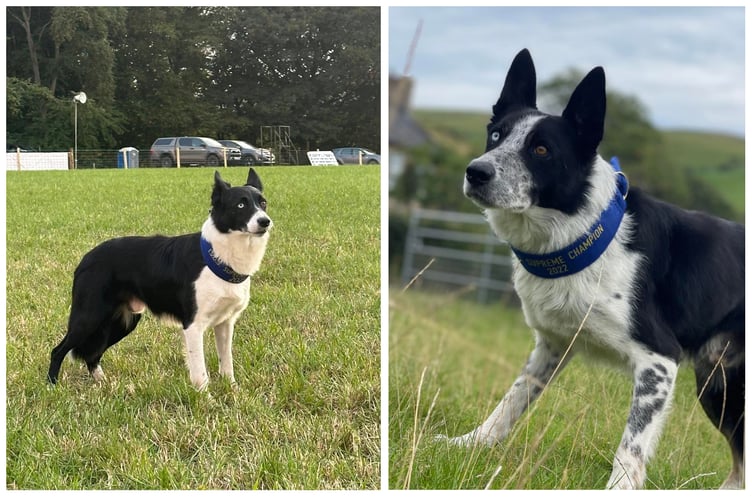
Though his training before the sales and the trials no doubt plays a part in the dog's success, Dewi said modestly: “I think I’ve just been very lucky to hit the right line.
“They seem to be breeding well, as well as being very, very good dogs, and that’s why I think they’ve done so well.”
For Jock and Bob, he said, “in training, you knew they were special”, choosing to keep them to work the farm with the many trophies collected at trials being “a bonus”.
At 32, Dewi is the youngest person to have won the International Trials twice.
He said his family were all there to support him at the finals in September: “Two dogs in the top three out of 600 dogs in the UK - that was pretty special.
“It’s a great feeling, really, looking at the shield in the house right by the kitchen table, where I can see it every day.
“[The family] were proud - it was nice to have the family there as support.”
On the day, he said: “I will remember Jock’s drive for time to come.
“I was quite emotional after Jock’s run; it took the pressure off me, and that helped me for the second time around the course.
“I felt that it had been a kind of practice, so I knew where the lines were and kept to them better with Bob.”
The trials test the ability of the dog, in partnership with its handler, to manage sheep across all aspects they may encounter in daily farm work.
The tests include gathering, driving, shedding (separating a group of sheep into smaller groups), penning (guiding sheep into a small designated pen) and singling (separating a single sheep from a group).
Founded in 1906 and having held trials every year except for the First and Second World Wars and the 2001 Foot and Mouth outbreak, the International Sheep Dog Society aims to “stimulate interest in the shepherd, the shepherd’s calling” and to “promote and foster the breeding, training and improvement of the working sheepdog”.
In 2025, Wales mopped up all three top spots at the International Trials, with all six dogs from Wales being led by four handlers.
Ireland had five qualifying dogs, Scotland had three, and England had two in this year's final.
Dogs from Talybont across the world
Though Dewi is a Welsh speaker, he trains his dogs using English so they can be sold all over the world - with his most recent record-breaking sale with Plascwta Jen, going over to the states to be worked on an ewe farm and compete in trials.
Jen, a 19-month-old bitch, broke CCM Skipton Auction’s records for the most expensive dog.
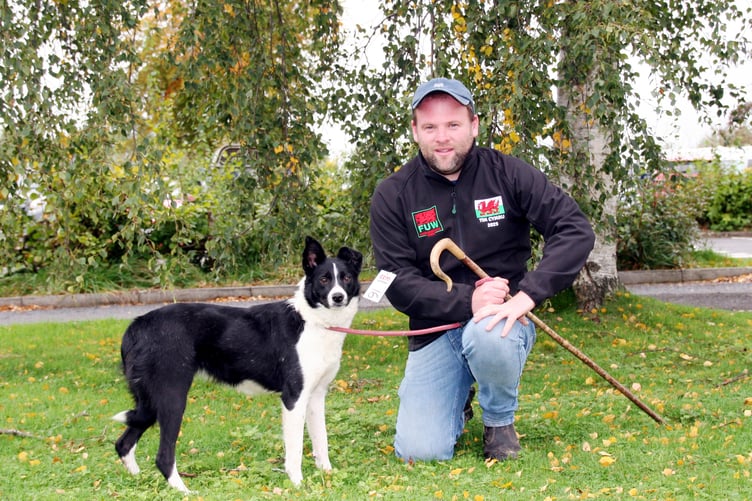
Dewi says he is still “sad to see them go” whenever he makes a sale, despite the five-figure sum, and he is still in touch with the owners of world-record breaker Kim, who is home in Newcastle on Tyne and has since bred a world record winning pup: “The new owners think the world of her”.
Border collies, which are said to originate from the Anglo-Scottish borders, get their name from the borders where they became known for mastering sheep herding on hills and mountains.
The border collie became popular in the 1800s for its ability to control the movement of sheep with their intense eye contact, referred to as ‘the eye’, as opposed to other breeds that use barking or aggression.
Though there is evidently plenty of money to be made in sheepdog sales, some see the tradition of sheepdog herding as under threat.
Some sheepdog breeds, such as the long-haired iconic Dulux dog, have been classed as “vulnerable” by the Kennel Club, with many traditional breeds now mostly seen as household pets.
Others cite the closure of smaller farms and improvements to 4x4 vehicles as threatening the future of the craft.
Shepherd Philip Walton from Cumbria, English champion at the national trials last year, cited his concern over a lack of interest from young people in sheepdog training, and fewer farmers having the time or need to train up dogs.
He explained: “The dogs are there for the management of the sheep, and if that's lost, it will all be lost, and disappear.”
However, the Scottish Highlands, the mountainous Lake District and the dramatic hills of the Welsh landscape, where sheepdog trials first began (1873 in Bala), may also be where the sheepdog herding tradition is preserved - with sheepdogs still being the preferred method for traversing the tricky terrain.
This seems to be the case for the Jenkins’ family, with Dewi breaking records for his dog sales despite being busy with ram sales this October.
His dogs can be seen working hard with their handler in tow across the Cambrian mountains, and their offspring working across the world, maintaining the UK tradition of sheepdog herding both near and far.
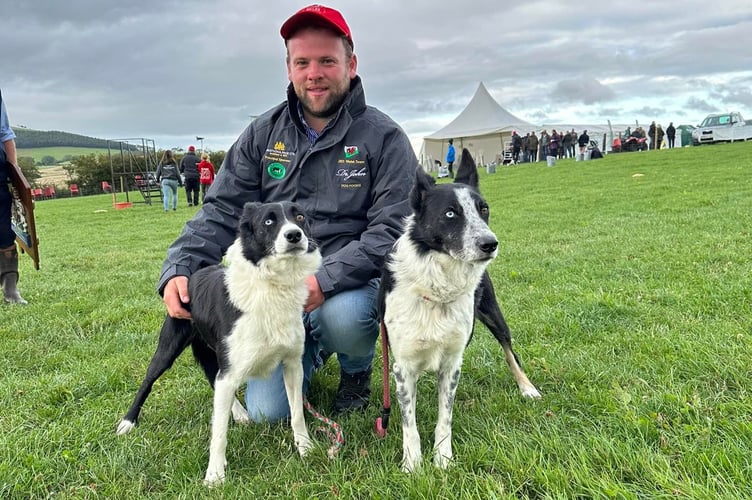




Comments
This article has no comments yet. Be the first to leave a comment.